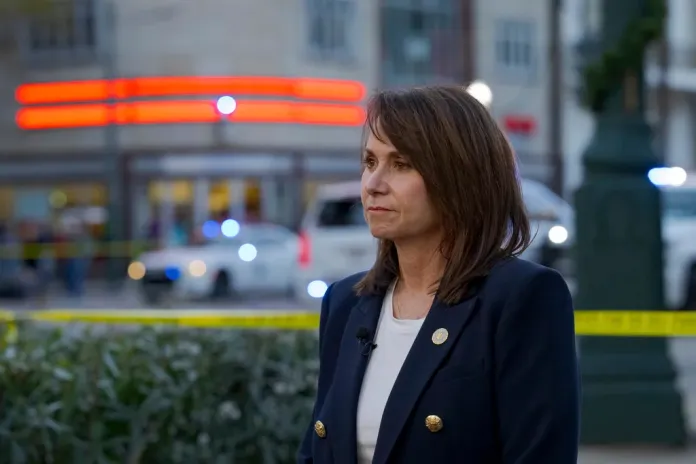California’s Proposition 50: Everything you need to know about redistricting vote
california voters faced Proposition 50 in a special election on November 4, 2025, a controversial redistricting measure that would adopt new congressional district maps drawn by the state legislature. These maps, favoring Democrats, would override those created by California’s independent commission meant to prevent partisan gerrymandering. If approved, proposition 50 would shift several Republican-held districts to Democratic control, potentially halving the number of Republican representatives from california in Congress and boosting Democrats’ chances in the 2026, 2028, and 2030 elections.
The measure has sparked intense political battles, with Governor Gavin Newsom leading support for the proposition, framing it as a response to efforts led by former President Donald Trump encouraging states like Texas to redraw maps in favor of Republicans. Critics accuse Newsom of using the measure as a political power grab ahead of a possible 2028 presidential run and stripping rural and conservative areas of representation.
Massive campaign spending has marked the race, with Democrats heavily out-raising Republicans.High-profile Democrats, including Kamala Harris and Barack Obama, have supported Proposition 50, while Republicans and prominent figures like Arnold schwarzenegger oppose it. The campaign has seen claims and conspiracy theories about ballot integrity and rapid election timelines.
Federal election monitors were deployed to several California counties amid the contentious vote, with the state promising reciprocal oversight. Multiple legal challenges by Republicans against Proposition 50 have been mostly dismissed in court.
Proposition 50 represents a key moment in the ongoing national conflict over redistricting, election control, and political power ahead of critical midterm elections.
California’s Proposition 50: Everything you need to know about redistricting vote
California voters will go to the polls on Tuesday to weigh in on Proposition 50, a redistricting ballot measure that is part of a larger national push to see which party controls the U.S. House of Representatives during President Donald Trump’s last two years in office.
Proposition 50 would adopt maps passed by the state legislature in August that would temporarily redraw Congressional District lines in favor of Democrats for the 2026, 2028, and 2030 elections, overriding a map by California’s independent redistricting commission, created to prevent election gerrymandering.
If voters approve Proposition 50, state Democrats would see the odds tilted in their favor for the 2026 midterm elections, while the number of Republicans representing Californians could be cut in half. California has 43 Democrats and nine Republicans in the House. Proposition 50 would shift five House districts into the competitive or easily winnable category.
NEWSOM CARVES ISSA’S HOME OUT OF HIS DISTRICT IN PROP 50 MAP
Republicans have ripped Gov. Gavin Newsom (D-CA) over the ballot measure, accusing him of callously stripping congressional representation from conservatives as well as residents in rural areas as part of a greedy power grab to launch himself onto the national stage as he looks toward a possible 2028 presidential run. Newsom, who will be termed out of office next year, has dramatically framed the Proposition 50 fight as one between California and Trump, good versus evil, and one that is for the very soul of democracy.
Here is everything you need to know about California’s special election on Nov. 4, 2025.
Why did California redraw its maps and why is Trump involved?
The coast-to-coast redistricting fight erupted after Trump publicly called on Texas to redraw its map to give Republicans a five-seat boost heading into the 2026 midterm elections. California called its push for a new map a countermeasure to “neutralize” the pressure Trump put not only on Texas Republicans but also on lawmakers in other red states, including Florida, Ohio, Missouri, and Indiana, to follow suit.
“We’re going to win the Midterms in Missouri again, bigger and better than ever before!” Trump posted on Truth Social.
Newsom, the leader of the world’s fourth-largest economy, said California had a duty to respond “to what occurred in Texas.”
“We’re neutralizing what occurred, and we’re giving the American people a fair chance because when all things are equal, we’re all playing by the same rules,” he said.
He has also said that if Proposition 50 did not pass on Nov. 4, 2025, “We’ll lose this republic, we’ll lose this democracy.”
“It is not an overstatement,” he said during a livestream. “This is Code Red. We all need to wake up to what’s going on.”
What do the new maps do?
If voters approve the maps, it would turn three Republican-held seats into safe Democratic seats and make two others more Democratic-leaning.
Specifically, the map would change districts held by Reps. Kevin Kiley (R-CA) and Doug LaMalfa (R-CA) in Northern California. In Southern California, Reps. Darrell Issa (R-CA) and Ken Calvert (R-CA) would be at risk, and in the Central Valley, Rep. David Valadao (R-CA) would have a much harder time getting reelected if the map is passed.
The new map would eliminate Calvert’s Inland Empire district and create a new seat in Los Angeles County that would skew heavily toward Democrats.
Money
Millions of dollars have been spent on ads and efforts for and against California’s Proposition 50. Democrats have raised more than four times the amount that rivals raise in recent weeks, according to campaign finance reports filed with the state by the three main committees campaigning about the measure.
Newsom’s committee supporting the redistricting measure raised $36.8 million between Sept. 21 and Oct. 18, bringing its total to $114.3 million, according to the report filed with the secretary of state’s office, which was not available until last week. It had $37.1 million in the bank and available to spend before the Nov. 4 special election.
In an unusually confident move, Newsom emailed supporters last week telling them to stop sending in money.
“We have hit our budget goals and raised what we need in order to pass Proposition 50,” Newsom said. “You can stop donating.”
The Republicans have said no such thing.
Supporters and opponents
Democrats and their allies, including high-profile politicians from across the country and some of California’s most powerful labor unions. At a Saturday rally in Los Angeles, Newsom was joined by former Vice President Kamala Harris, Los Angeles Mayor Karen Bass, Sens. Adam Schiff (D-CA), Alex Padilla (D-CA), and Amy Klobuchar (D-MN), and Rep. Jasmine Crockett (D-TX). Television ads supporting Proposition 50 have featured appearances by former President Barack Obama, Sen. Elizabeth Warren (D-MA), and Rep. Alexandria Ocasio-Cortez (D-NY).
Opponents of Proposition 50 include former House Speaker Kevin McCarthy, former California Republican Gov. Arnold Schwarzenegger, and Republican donor Charles Munger Jr., the son of the former Berkshire Hathaway vice chairman.
Conspiracy theories, claims, and complaints
California Secretary of State Shirley Weber was forced to push back on conspiracy theories on social media sites that mail-in ballots for the state’s Nov. 4 special election were purposefully designed to disclose how people voted.
Weber refuted claims by some Republicans that holes in ballot envelopes allow election officials to see how Californians voted on Proposition 50. She said the person could simply turn the paper over when putting it in the envelope, and no one would see how that person voted.
Another Republican complaint has been about the speed at which Proposition 50 has moved and has claimed it is vulnerable to election errors.
The state, which is battling a $12 billion deficit, is already cleaning up one multimillion-dollar mess it made after mailing inaccurate guides about the special election. The 2025 Voter Information Guide, which was sent in late September to 8.5 million voters to provide data about Proposition 50, incorrectly labeled District 27 as District 22, according to the secretary of state’s office.
Federal and state election monitors
The Justice Department announced it would dispatch election monitors to five California counties: Orange, Los Angeles, Riverside, Kern, and Fresno.
U.S. Attorney General Pam Bondi said the move would “ensure the American people get the fair, free, and transparent elections they deserve.”
California Attorney General Rob Bonta (D), in response, has pledged to send the state’s own army of election watchers to watch the DOJ’s watchers.
California GOP Chair Corrin Rankin, a former Trump campaign surrogate, asked fellow Californian and Justice Department civil rights head Harmeet Dhillon to send the monitors. Newsom called the move “a bridge too far.”
Bonta agreed, speculating that Trump was preparing to challenge the potential passage of Proposition 50. He said Trump’s efforts foreshadow attempts to challenge future elections.
“He is laying the groundwork,” Bonta said, adding that Trump still claims he won the 2020 election even though it has been proven multiple times that he lost. “He is socializing an idea that is very dangerous. All indications, all arrows show that this is a tee up for something more dangerous in the 2026 midterms — and maybe beyond.”
Lawsuits
Multiple lawsuits both in state and federal court have been filed by Republicans.
Almost all have been dismissed.
The latest involves Issa and Rep. Ronny Jackson (R-TX).
The lawsuit, filed Wednesday and dismissed by a federal judge in the Northern District of Texas on Friday, alleged that Proposition 50 directly hurt Issa as a congressman and a California voter. Issa claimed if Democrats gained control of the House, he would lose “seniority advantages in committee proceedings” and have “reduced influence over legislative priorities and committee work affecting my constituents.” He said a shift in his power would negatively affect veterans and immigrant communities in his district.
Jackson claimed he would “will lose specific, concrete resources and authority necessary to serve his constituents because California’s scheme will succeed in flipping House control.” The lawsuit named Newsom and California Secretary of State Shirley Weber as defendants and asked the judge to stop the implementation of the new map should it pass on Tuesday.
Other lawsuits, including one filed by Republican gubernatorial candidate Steve Hilton, have also been dismissed.
" Conservative News Daily does not always share or support the views and opinions expressed here; they are just those of the writer."




